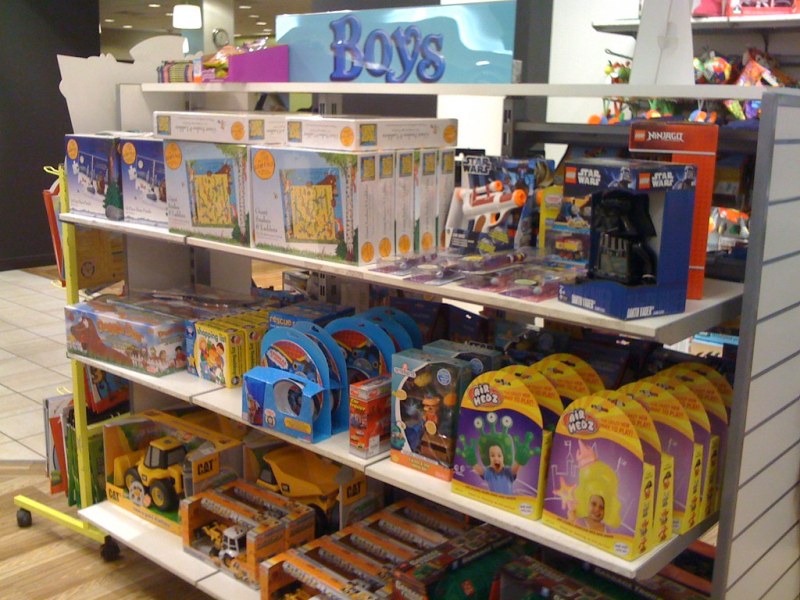One insecurity I think about often is my wobbly foundation in STEM (Science, Technology, Engineering and Math) subjects. I didn’t grow up with a sustained interest in Legos or RC (remote-controlled, radio-controlled) cars. I was always more occupied with perfecting my nail art skills, shoddily designing the next couture dress of my dreams and crafting anything and everything. My interests expanded as I grew older, but I became more self-conscious and regretful of the childhood hobbies I filled my downtime with, increasingly feeling that the activities I liked were girly and “non-engineer-ey.”
Though these choices of activity should not inherently limit anyone’s ability or aptitude towards their profession or interests, the fact that I often doubted the validity of my interests and identity threatened my chances of staying in a STEM profession. Our society systemically differentiates between girl and boy activities — a quick google search for “toys for boys” brings up “robots & robotic pets,” “vehicle, trains & remote control toys” and “building sets & blocks” while the first eight results in searching “toys for girls” includes either “dolls,” “accessories” or “clothes.” Whether or not girls truly have these preferences, society has long viewed the interests and activities of girls through a certain lens — one which does not correlate strongly with our society’s description of engineer/scientist — and it’s become increasingly important to instill a level of confidence in girls to continue making these stereotype-breaking choices once they identify STEM as a potential interest.
So what can we do to remove these self-doubts for women in STEM? How can we instill a confidence in them so that whoever they become and whatever they’re interested in is extremely valuable and valid? How can we help them craft an identity which should not shake the validity of their choice to embark in the STEM profession?
We can facilitate this through a number of initiatives.
Extracurricular STEM programs early on in life have been cited as one technique for increasing the number of women majoring in STEM disciplines. These STEM programs have the freedom to take on numerous forms, as they must focus on a wide range of early ages; between the ages of 6 and 18, girls’ interest in STEM decreases from 66% to 4%. Additionally, research shows that subject choices by classroom peers affect girls’ preference for STEM subjects; when their female peers do not have a preference for STEM subjects, other girls are less encouraged to display these preferences for fear of violating gender norms. Not only do these extracurricular programs allow girls to perform better in STEM because they provide exposure to these subjects earlier on, but finding these communities can also help them know, and believe, that they belong.
Breaking the stereotype is uncomfortable: most girls make the choice to veer away from STEM subjects when seeing more boys choose STEM activities. Some girls will even “underperform in tasks in which they have to ‘think like scientists’” because they already associate thinking like a scientist with a masculine trait. Girls as young as age 6 begin to harbor ideas that STEM is meant for males; exposing them to communities of other girls who choose STEM can help to combat this preconceived notion. Some programs include Girls Who Code, a nonprofit organization aiming to increase the number of women in computer science, and STEM for Her, a non-profit foundation promoting education and providing opportunities for girls to pursue successful STEM-related careers. These programs have proven highly effective in influencing undergraduate majors down the line — Girls Who Code reported its participants to study computer science in college at 15 to 16 times the national average.
Educating adults who have a significant impact on a child’s early years can also help solidify a girl’s sense of belonging in STEM areas. A large percentage of adults harbor a number of biases such as believing STEM subjects like mathematics require a natural ability and are fixed-skills. Additionally, parents unintentionally reinforce gender stereotypes when they overestimate their sons and underestimate their daughters, unconsciously choose to process praise (a type of praise that emphasizes the work, effort or actions of a child) their sons more often and believe that daughters must try harder than sons to succeed in subjects such as mathematics. Considering a 2013 study which found that parents’ praise to 1-3 year-olds was predictive of their children’s motivational frameworks five years later, early adult interactions seem to have made solid contributions to the gender disparity in STEM.
Additionally, the impact of more female role models cannot be overlooked. The fact that STEM roles are often portrayed as men’s jobs or associated with more male-dominated culture and activities may deter females from discovering a passion for STEM or envisioning a sustained interest in the field for themselves. Personally, inspiring female role models have played a huge part in keeping me in STEM, from Gwynne Shotwell to Hedy Lamarr, especially because I have been able to see more of my diverse passions represented in their work, reminding me that I am as much an engineer as the boy next to me. This feeling is generally true for other girls; when girls come into contact with female role models in STEM, and more broadly, individuals with whom they can identify, their self-concept in STEM, attitude toward STEM and motivation to pursue STEM careers improve.
It’s unfortunate that a boy playing with his toys may be seen as a curious kid with an aptitude for tinkering and problem solving, whilst all the times I diagnosed my sewing machine in order to continue my fashion projects were seen just as a feminine hobby. Though it will take generations to combat the years of subtle reinforcement of gender stereotypes in STEM, priming a girl early on for STEM can give her the confidence and knowledge to sustain her STEM choices and provide her with the best possible chance of staying true to her professional dreams.
